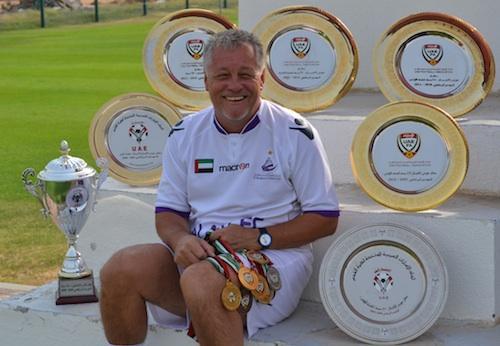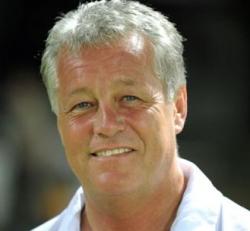Wayne Harrison on Being A Better Youth Soccer Coach
Wayne Harrison, Co-Founder Soccer Awareness Elite Academy, shares his thoughts on the Power of Positive Reinforcement. A former pro soccer player at Blackpool F.C. in the English Championship league as well as the Academy Director, Harrison was also the Youth Director Al Ain Football Club in the UAE. An author of more than 12 books on soccer coaching, he now coaches youth soccer, writes and presents at coaching symposiums worldwide. Harrison holds a UEFA ‘A’ License and the NSCAA Premier Diploma, as well as a bachelor’s degree in applied physiology and sports psychology. He is the Director of Coaching for Total Futbol Academy.
Walking around watching games at tournaments it is also interesting listening to the information coaches were giving out to their coaches; and perhaps more importantly; the WAY they delivered it.
We all have our moments (myself included) where we get frustrated and let ourselves down with unwarranted criticism to a player or to our team; but most of us try to keep the negative comments to a minimum. (After all, soccer is an emotional game isn’t it; and we are all human and not perfect.)
I like to think my own feedback from the sidelines is 95% positive; UNLESS a player is not working hard enough. I also object to when players are trying things that he or she are not proficient at during critical games. I want players to be as effective as possible doing what they are good at. In other words, when players are making bad decisions … that is a reason to get upset.
Anything else is simply part of the learning process. Players will make mistakes and we as coaches MUST HELP players when they make mistakes; not chastise them. We must try to see the good in what they attempted.
For example, if it was a poor pass and the player gave the ball away but at the same time it was a GREAT decision We should praise their decision and encourage them to make a better pass next time. This approach encourages the player to try again, and not be afraid. Coaches can always work on improving the skills. That is our job, right?
So, back to what we started with; many very good coaches were giving positive and precise information and avoiding criticism of their players as best they could; and you could see the players were not afraid to try things on the field.
There were also some quite vocally abusive coaches focusing on all that was wrong and praising very little.
You can be sure many would HATE to play for a coach like this; and if we as coaches “PERSONALIZE” this by asking “Would I want to play for a coach who just said that?” (meaning would you want to play for YOU), then this issue can be come crystal clear. I believe this is a good guideline to work off of, don’t you think?
So ask yourself “Would you like to be coached by a person just like you?”
I would like to play for me because I try to make it fun and at the same time educational; and I don’t take myself too seriously; except when it really matters; and the players know when can have a laugh and a joke; and when we need to work. In my opinion, it’s a fine line but easily achievable to get the best out of players.
And when it is fun, we as coaches should enjoy it more too; after all, we want to have a great time also.
Back to those same abusers: this is damaging behavior for the players confidence and development, plus you could the tension in these players who were almost afraid to try anything because if it didn’t work and they would get shouted at.
The very fact the players were worried as the ball came to them made them give the ball away even more. The fear of inciting the coach to yell at them prevented them from being imaginative on the ball.
Coaches should help their players relax and be successful on the field. We must all try to have a positive attitude. Yes, it is difficult sometimes but we need to fight the inner demons and praise our players. It is important to be positive.
Coaches need to realize no player tries to give the ball away deliberately.
Players all want to be successful, no one wants to let down their teammates, their parents; or their coach.
All youth soccer players want to be the best they can be.
This past weekend at soccerloco Surf Cup, a player was asked to play a ball to the feet of the striker. He started with a dead ball free kick, and he passed it 15 feet in the air and it went way over the strikers’ head. I heard it said that “He didn’t know his feet were on the top of his head.” Ok, not that funny but this was a successful comment. The point was made about a bad pass and the player knew it; but he didn’t feel bad about it; he just laughed.
The goal was achieved with a joke rather than a criticism. It got a laugh on the bench too.
We all still have our moments, and get mad at ourselves; but as their coach; we must treat the players, as we would want our coach to treat us.
How would we feel if we were the player making the mistake? How would we want to be spoken to by the coach? Ultimately, we all want to encourage players to do the best they can and not instill fear so the player is afraid of making the next pass.
We are basically talking about the PSYCHOLOGY of the game; and this is still a very underrated part of teaching the game. How to get into each players head to know how to get the best out of them is important. And every player is different; but most respond better to encouragement than negativity.
It’s all good food for thought and there is no one answer; but positivity, encouragement, and constructive feedback all help the learning process and makes it much more enjoyable experience for every player.
The Soccer Awareness Elite Academy (SAES) is new a soccer development program, helping develop soccer awareness and intelligence in the USA. It is a non-competitive program that works along side of today’s best youth soccer clubs, providing additional training.
This elite academy is focused on developing how a soccer elite player thinks – the MIND of the player – and is based on proven scientific principles of development.






